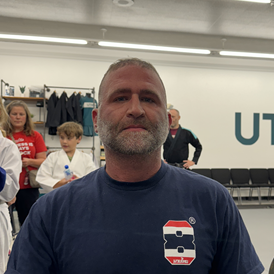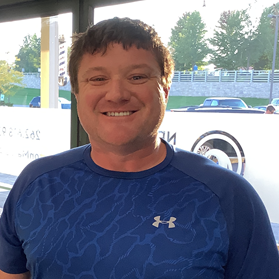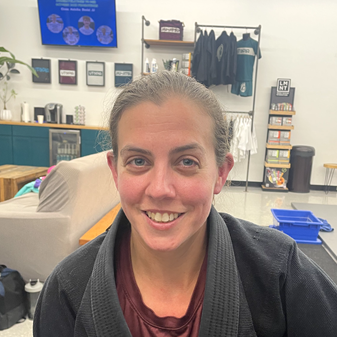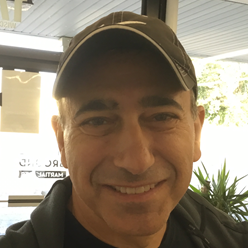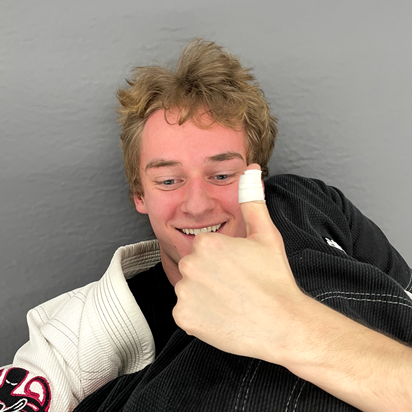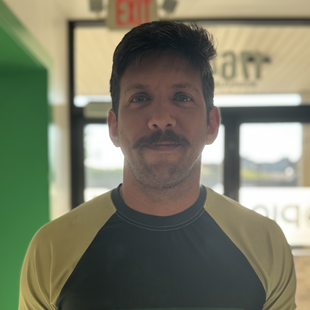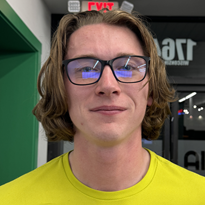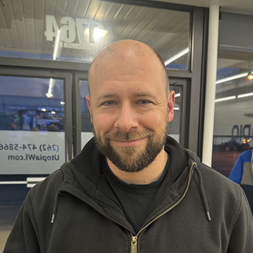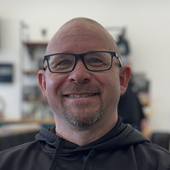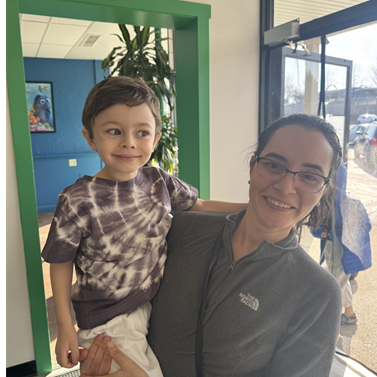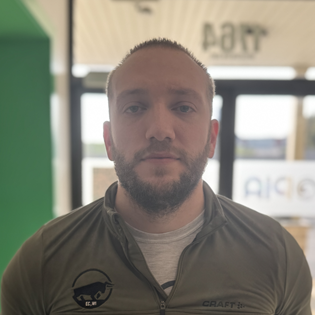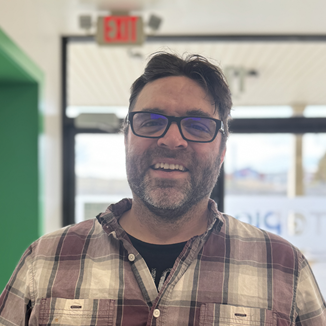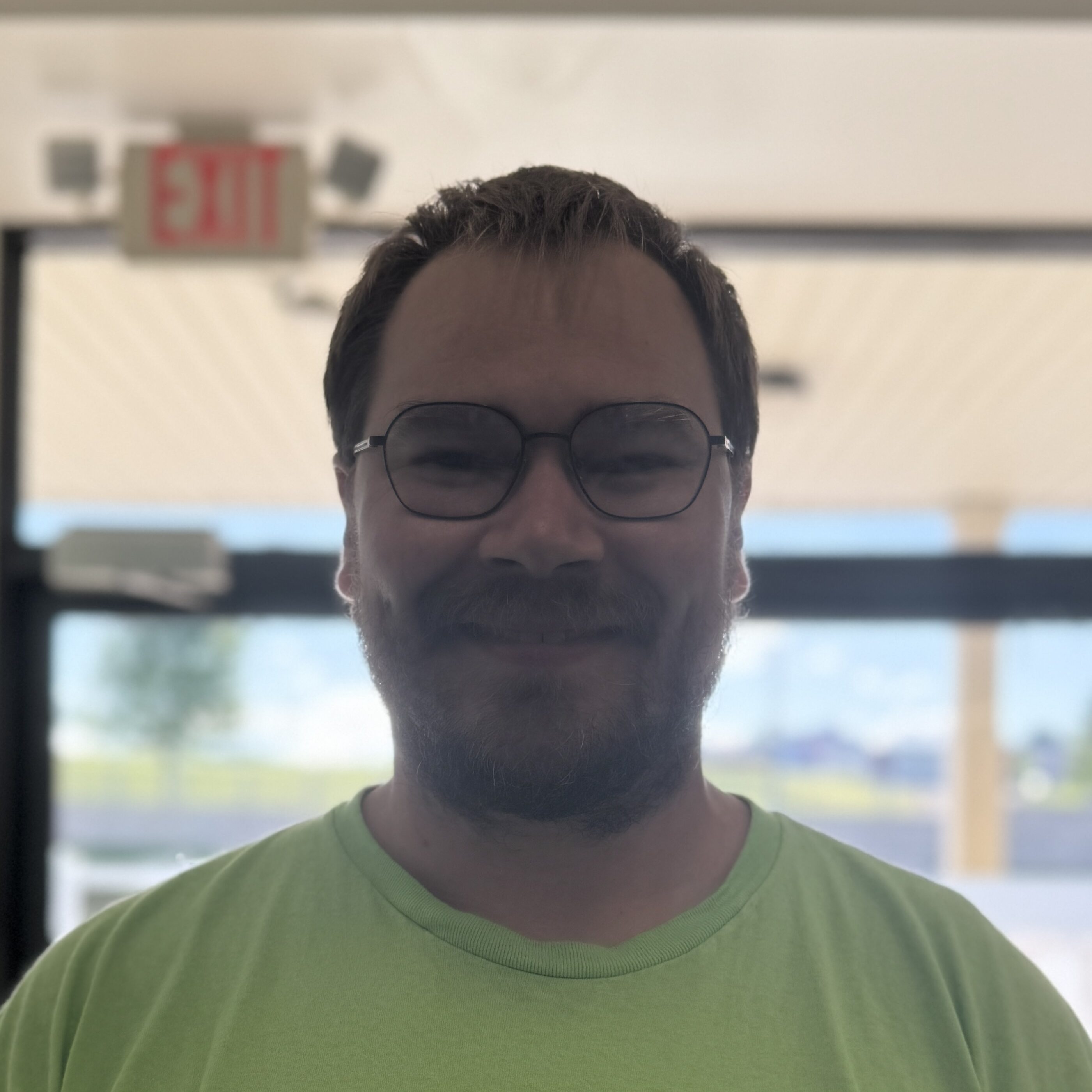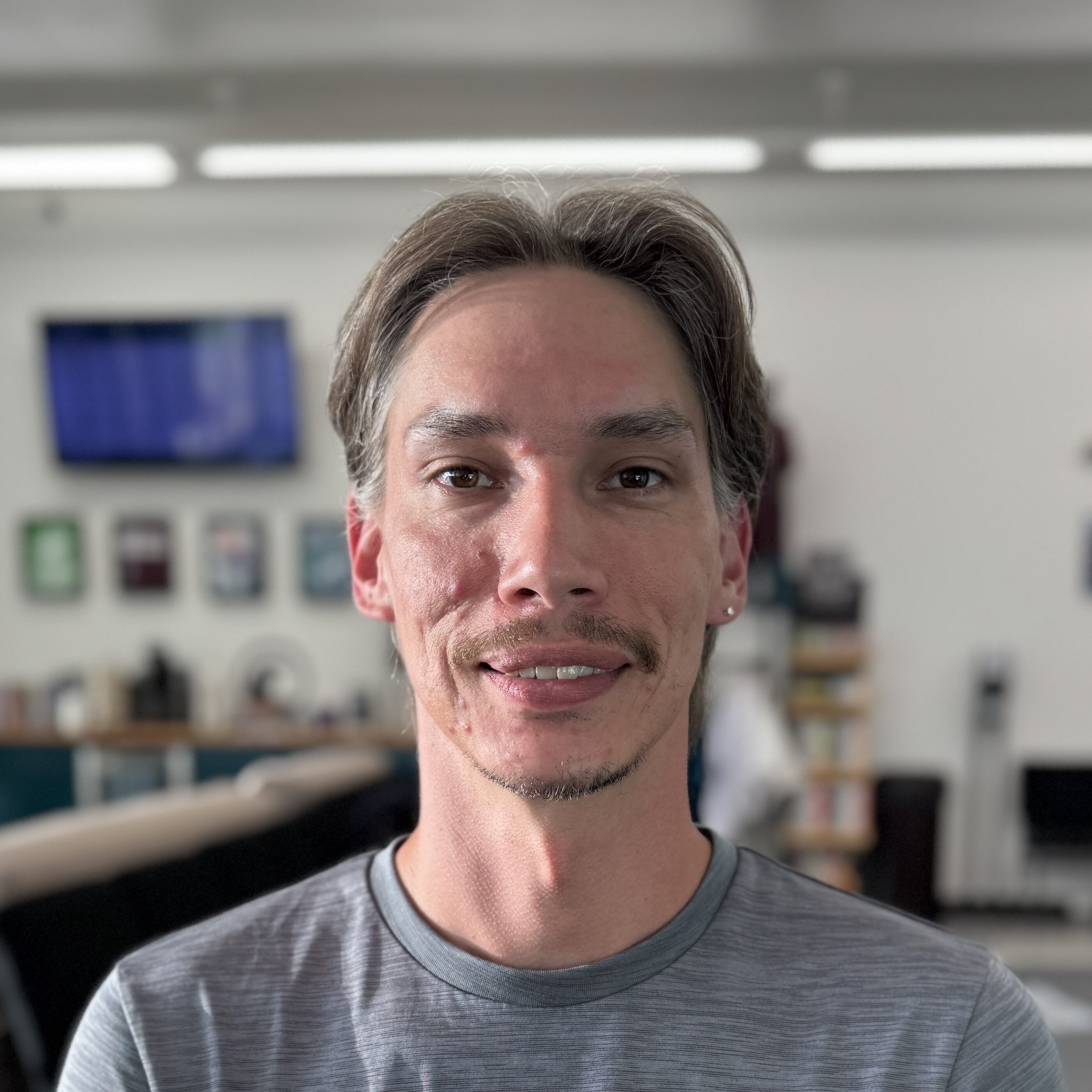In this episode of the Inside the Wave podcast, Perry Wirth had the pleasure of sitting down with Bob Duffy, a longtime friend and a significant figure in both the jiu-jitsu and law enforcement communities. Bob is not only a gym owner but also a seasoned law enforcement officer (LEO) and a dedicated trainer for other officers. Our conversation delved deep into his journey, the integration of martial arts into law enforcement training, and the challenges faced by officers today.
This episode provided a comprehensive look at the intersection of jiu-jitsu and law enforcement, highlighting both the challenges and opportunities for improving officer training.
Bob Duffy’s insights underscored the importance of ongoing, realistic training and the potential for martial arts to play a crucial role in law enforcement wellness and effectiveness.
About Bob Duffy
Bob Duffy is a distinguished figure in the realms of martial arts and law enforcement, with a career that spans over two decades. His journey is marked by a seamless integration of his passion for martial arts and his commitment to public service, making him a respected authority in both fields.
Early Life and Martial Arts Beginnings
Bob’s foray into martial arts began in his childhood, a common starting point for many of his generation. He initially trained in judo, karate, and taekwondo, the prevalent martial arts disciplines of the time. His dedication to taekwondo continued into the late 1990s, a period that marked a significant turning point in his martial arts journey. It was during this time that his instructor began traveling to Torrance to train in Gracie Jiu-Jitsu, bringing back new techniques and philosophies that would profoundly influence Bob.
Transition to Jiu-Jitsu and MMA
Bob’s first exposure to jiu-jitsu in the late 1990s ignited a passion that would steer the course of his martial arts career. By the early 2000s, he was training under Adrian Serrano, a local legend with over a hundred MMA fights. This period saw Bob not only training intensively but also stepping into the ring for MMA fights, an experience he now reflects on with a mix of pride and incredulity. His involvement in MMA extended to coaching, a role he embraced until around 2010 when he decided to focus exclusively on jiu-jitsu.
Founding Crossover Jiu-Jitsu
In 2013, Bob, along with his friends Ryan, Dan, and Jorge, founded Crossover Jiu-Jitsu in Milwaukee. The academy has since flourished, expanding to three locations in Tosa, Maguanago, and Waukesha. Crossover Jiu-Jitsu stands as a testament to Bob’s dedication to the martial arts community, providing a space for practitioners to train, learn, and grow.
Law Enforcement Career
Parallel to his martial arts journey, Bob has built a formidable career in law enforcement. He has been serving in various capacities for about 20 years, starting with the Milwaukee County House of Corrections and later joining a local sheriff’s office. Currently, he holds the rank of sergeant within the corrections division, where he oversees defensive tactics training. His role involves training not only the corrections division but also patrol officers and SWAT teams, leveraging his extensive martial arts background to enhance their skills.
Contributions to Law Enforcement Training
Bob’s expertise in martial arts has significantly influenced his approach to law enforcement training. He is an adjunct instructor for Chad Lyman’s company, C4PJJ (Police Jiu-Jitsu), where he has been instrumental in integrating jiu-jitsu into police training programs. Additionally, he founded the 1078 Brazilian Jiu-Jitsu Project, a unique initiative focused on law enforcement wellness. This project, in collaboration with SPG (Straight Blast Gym), aims to provide officers with regular access to Brazilian jiu-jitsu training, recognizing its benefits for mental health, stress management, and PTSD.
Philosophy and Ethos
Bob Duffy’s philosophy is deeply rooted in the belief that martial arts training, particularly jiu-jitsu, is essential for law enforcement officers. He advocates for a holistic approach to training that goes beyond mere techniques to include concepts and strategies that can be adapted to the dynamic and unpredictable nature of law enforcement work. His emphasis on adaptability, problem-solving, and ongoing training reflects his commitment to preparing officers for the complexities of their duties.
Bob’s career is a blend of passion, dedication, and a relentless pursuit of excellence. His contributions to both the martial arts and law enforcement communities are profound, and his work continues to inspire and influence those around him. Through his efforts, he has not only elevated the standards of training but also fostered a culture of continuous improvement and resilience.
What You’ll Learn
- Jiu-Jitsu in Law Enforcement: How jiu-jitsu principles apply to law enforcement, enhancing officer safety and control.
- Defensive Tactics: An overview of the importance of integrating defensive tactics with other law enforcement skills.
- Law Enforcement Training: Insight into the challenges and solutions for improving law enforcement training frequency and quality.
- Mental Health Benefits: The role of jiu-jitsu in managing stress, PTSD, and overall mental wellness for officers.
- Training Gaps: The reality of training deficits in law enforcement and how some officers are taking the initiative to self-improve.
- Adapting Jiu-Jitsu: The importance of adapting jiu-jitsu techniques to suit law enforcement objectives and environments.
Transcript
Perry Wirth:
Welcome to the Inside the Wave podcast, episode six. I’m joined today with longtime jiu-jitsu community friend, Bob Duffy. That’s right. Gym owner, law enforcement officer, LEO. trainer of law enforcement officers. Tell us a little bit about yourself.
Bob Duffy: Hi, I feel like we’ve known each other for like 17 years, 16 years, we’ve known of each other and we’ve we’ve grown closer over the last few years, I would say for sure. So, yeah, I guess I’ve got a pretty long like martial arts history. And then that’s overlapped with my my career within law enforcement. So I started doing martial arts as a kid, like like many people of my generation started doing judo, karate, taekwondo. That was all that was around at the time, you know, and did taekwondo for a long time until probably the late 90s when my instructor started traveling out to Torrance. Training Gracie jiu-jitsu and bringing it back. So this was like 98 99 was my first exposure to jiu-jitsu And then from there, you know, I got I got the itch, you know So I started doing that more more than anything And eventually licked up with Adrian Serrano here local living living legend like living pine over over a hundred MMA fights.
Perry Wirth: Uh-huh
Bob Duffy: Yep. And so in the early 2000s, I started training with him, did some MMA fights, which I thought was a great idea at the time, which now I look back on, you know, what the hell was I thinking? It’s good for your brain. Yeah, it was wonderful. So I did that all through kind of the early 2000s. I, you know, started coaching with him and things like that up until about 2010. And then I really just kind of transitioned over to jiu-jitsu and just ran with it from there. And 2013, myself and a couple buddies, Ryan, Dan, Jorge, kind of started up Crossover Jiu-Jitsu here in Milwaukee. That’s still going strong. We got three locations now, Tosa, Maguanago and Waukesha. But then aside from that, I’ve got, I’ve got like a lot of irons in the fire, right? On top of that, I obviously work at a local sheriff’s office. I’ve been doing that for, all said and done, about 20 years. I worked for Milwaukee County House of Corrections for about four years, and then the sheriff’s office I’m at now, I’ve been about 16 years. Currently, I’m a sergeant within our corrections division, and then I oversee a lot of our defensive tactics training.
Perry Wirth: Where does like sergeant line up in the in the ranks of things?
Bob Duffy: Yeah, so every agency is a little different. But at our agency, basically, within our corrections division, we have officers and then sergeants. And then it goes right into our superintendents and our administration. So kind of like a midline supervisor.
Perry Wirth: How long have you been in law enforcement for?
Bob Duffy: So all, all set about 20 years. Um, I’d say for a good majority of that, at least 10 plus years, I’ve been heavily involved in like the training end of things. Um, training, not just like our corrections division, but also our patrol guys, our SWAT guys, kind of the full gambit. Um, and I’ve been lucky to do that because of my experience with like martial arts and jiu-jitsu and stuff. Um, I’ve kind of got a little bit of, you know, a deeper knowledge of that stuff that I’ve been able to bring to the table. So. And then, in addition to that, obviously I work, I’m an adjunct instructor for Chad Lyman’s company, C4PJJ, Police Jiu-Jitsu. I’ve been doing that for a number of years now. And then I also started a project, we call it the 1078 Brazilian Jiu-Jitsu Project. It’s a really unique project. It’s more focused on like law enforcement wellness and actually like teaching guys defensive tactics per se. Um, but it’s really, uh, it’s, it’s linked up with, uh, SPG straight blast gym to really, uh, provide officers with regular ongoing access to Brazilian jiu-jitsu training, which we now know has tremendous, you know, mental health and physical benefits. There’s been a number of studies and things done like that on that, as far as like stress management, PTSD and whatnot. So.
Perry Wirth: Um, and you’re an official instructor with the state as well. Correct. Yeah. Right. So, so you’re not just like a officer that does jiu-jitsu and, you know, shows your colleagues on the side. So some techniques, right? Like you’re a defense and arrested arrest tactics instructor with the state. Yeah. Right. Yeah.
Bob Duffy: So they, they recently kind of, uh, merged, um, uh, these together. There used to be POSC instructors, which is Principles of Subject Control. And then there was DAT instructors, Defense and Arrest Tactics. They’re pretty much the same. They recently merged them under the umbrella term of Defensive Tactics Instructor. And there’s a lot of terms that kind of get used to say the same thing in different places. You know, here in Wisconsin, we use the term Defensive Tactics. Other places will use Control Tactics or Arrest Tactics.
Perry Wirth: So let’s talk about what exactly defensive tactics is and isn’t. So what what does it consist of? What doesn’t it consist of? So like, it doesn’t consist of like, firearms training, or does it?
Bob Duffy: So there’s, there’s often an overlap and that’s kind of one of the unique things where, and one of the things that we’re trying to really move towards is integrating skill sets because, uh, defensive tactics itself usually consists of things like empty hand control tactics, potentially some strikes, um, things like that. Um, even getting into like weapon retention and whatnot, but then once the firearms come out, that’s where kind of firearms training picks up. Um, but the reality is in real situations, these, you know, skills overlap, right. Um, and they, you know, you have to be able to transition between them. So we’re trying to make it so that training, uh, is more representative of that. So instead of just trying training in like these silos of, we do defensive tactics over here and then firearms is over here, you know, kind of really starting to bring them closer together. Cause that’s, that’s how it really happens in real life, you know? So. We’ve got to be able to kind of transition between all those skills.
Perry Wirth: focusing on keeping you safe, but it’s focusing on keeping the assailant, I always just say the bad guy, we probably can’t say the bad guy. But I always say like, keeping them safe, right. But it goes just from, you know, anything from, you know, defending yourself to extracting people from vehicles or handcuffing, or even just controlling until, you know, your teammate can arrive on scene and whatnot, right.
Bob Duffy: Yeah, so it’s one of the challenges of training is like law enforcement work is so dynamic and so varied. It’s it’s every every situation has its own nuances and and requires a different response and potentially a different, you know, skill set, whether that’s just communication skills, whether that’s crisis intervention skills, whether that’s defensive tactics skills. So it’s like, it’s really tough to, um, you know, uh, just narrow in and say like, this is how we do, uh, do it this one way. Right. Because, uh, these, these situations are really dynamic that officers are involved in. So, They’ve got to be versatile and they got to be adaptive. That’s one of the big things that we’re really trying to create is adaptive officers because Those situations are so varied. It’s hard. It’s hard to do things just one way.
Perry Wirth: Yeah, I believe it and props to you guys and a lot of people don’t think about this but You know, jiu-jitsu and every other grappling martial art, right? If you’re doing jiu-jitsu or judo or wrestling, they’re really, they’re really all the same. It’s really just your rule set that’s changing between each of them, right? Like you can, you know, some techniques are going to work better in certain martial arts, right? But that’s because the rules and the scoring system and the pace of the match and how you finish the match, right? Dictates like what move works best in this martial art. And a lot of people don’t realize it, but you guys have a lot of, well, I’ll just call them rules or guidelines between like how you need to approach things, what you can’t do, what you can’t do, when you can do something and when you can’t do something. And people don’t realize that like you’re playing by a rule book, but not and not everyone else is. Yeah.
Bob Duffy: So like there is a legal rule book right in court, but like you don’t have to follow that. So it’s a funny thing. A lot of times I hear people sometimes say like, you know, on the street, there’s no rules. That’s nonsense. And it’s something I don’t remember who I originally heard saying that. But it’s so true is like, Law enforcement officers have probably more rules to follow than anybody.
Perry Wirth: There’s no rules for half the battle, for the opponent.
Bob Duffy: And that’s one of the biggest challenges. So law enforcement officers have a ton of constraints on them. And that starts all the way from the Constitution on down, through state statutes, agency policies, through their training. There are constraints placed on the officer. But the subject doesn’t necessarily have those constraints. There’s a ton of like legal parameters that officers have to stay within and whatnot. So it’s challenging because officers are heavily constrained in a lot of situations. And you got to remember that oftentimes they are having to make like high stake decisions in like split seconds, right?
Perry Wirth: And we’re literally it could, you know, in scenarios that you can’t train in real life for, right? One of the benefits of jiu jitsu is you can I mean, you can do jiu jitsu as hard as we want each other and we’ll both walk away super safe. Yeah. Right. But like, you know, when we start going to striking, we can’t spar full on all the time, because you’ll probably knock me out. And then like, you take that to the next level of police officers, like you can’t have police officers going full blown at each other, because there are times that where you guys need to make decisions that, you know, are have huge consequences.
Bob Duffy: Well, and that’s I think that’s one of the things that makes training so so challenging is so like when you look at training somebody for like MMA or for jiu-jitsu, right? Like, we, we kind of can gauge what the environment’s going to be like, we have an understanding, right? It’s pretty, it’s low variable, right? We understand what the rule set is. There’s there’s parameters there that that are are pretty well defined, right?
Perry Wirth: For sure. Like, if we’re rolling, I don’t have to worry about Bob ever punching. Right, exactly. So
Bob Duffy: But I would say- Or another person jumping in. Right, exactly. So for law enforcement work though, it is like the most dynamic, right? The environment is ever-changing. Like grass, concrete, crowds, one-on-one. Inside, outside, it’s cold out, it’s hot out. Time of day, there’s noise. I mean, this is, it’s so dynamic and you don’t get to choose what that environment’s gonna be like, right? And then the subject behavior is unpredictable, right? You don’t know what their mindset is necessarily. You don’t know if there’s weapons involved necessarily. You don’t know what their motivation is. So, I mean, these are, it’s extremely like hard, environment and situations to like prepare for, right? Like it’s just ever changing. So that’s where when it comes to training officers, it’s challenging, but I think that’s where we really kind of fall back on building adaptable officers, right? Like making them active problem solving, active core problem solvers. Core competencies, right? Exactly. And we do that by, and this has varied over the years. So a lot of defensive tactics programs are really like technique heavy, right? Like learn these techniques, memorize these techniques, but we know that that doesn’t translate over to skill, right? So what we’ve really focused on, especially with like C4C and whatnot is, giving a deeper understanding of why things work. We start with some concepts that are kind of, you know, pretty versatile. And then we will give techniques as examples that like reinforce those concepts. But it’s not, it’s a classic adage like, you know, This is a way, not the way, right? And at the end of the day, what we’re really trying to do is make it so that officers can have a versatile tool set and solve problems like and use good, appropriate force at the appropriate time. That’s our overall goal, you know, so.
Perry Wirth: So let me tell you and you I think you know because we talked about this as I was getting started You know getting involved with you and Chad and C4C, but as in a jiu-jitsu instructor We have a lot of people that come into our academies that are that are officers that are like, hey I want to learn some jiu-jitsu. I’m an officer and I heard this is good for my work and I would have people come into my academy and I’m like, hey, you know, I can show you jitsu, but I I don’t take it word for word of like, hey, what I teach you in a classroom is gonna work for you out in your environments. So I originally got involved with you guys because I wanted to better help the people that were coming into my academy. I wanted to learn the rules that they need to play by. I wanted to learn more about what’s going on in like in your heads while you’re doing stuff. So like you said, a lot of jiu-jitsu instructors, they wanna teach you the techniques and that’s not going to benefit them as much as teaching them the concepts.
Bob Duffy: Yeah. And that’s where I think. So jiu jitsu is a broad term. And I think that sometimes people get really, you know, fixated on jiu jitsu, meaning like this type of jiu jitsu, right? I look at jiu jitsu as like, a broad category, like I would, I would say, a car Yeah, like there’s many types of cars. And certain cars are better designed for certain purposes, right? Like a NASCAR has a very specific purpose. I would equate that to like IBJJF jiu jitsu turns left real well. It is the it is the that’s Like, that’s the sportive element of that, right? And then you’ve got, you know, these little crazy off-road cars, right? Like, that’s probably like the, that’s probably like jiu-jitsu for MMA, right? Something like that. But then you have cars that are specifically designed for police, right? And, you know, we use police cars for police work. It’s the same thing with jiu-jitsu. Like, we have to use police jiu-jitsu. It’s not, and this is where I think people get confused sometimes. They’re like, we’re not advocating for, you know, sports style jiu-jitsu to be used in law enforcement. Yeah, it’s the same but different. Right, you’re looking at it through a different lens and we’re trying to accomplish different objectives. And it’s one of those things like, How would you what would you define jiu jitsu as like, how would you define jiu jitsu?
Perry Wirth: Like what would people roll on the ground with pajamas on ground karate? It’s so hard. It’s so different. It’s so different for everyone. I tell every student that comes in, like, I don’t know what jiu jitsu is going to be for you. But I know what it is for me, right? And some people do jiu-jitsu for self-defense. Some people do jiu-jitsu to be the sheepdog, to like protect other people. Some people do it for police officers. Some people do it for MMA. Some people just do it for fun. And those are like, they’re all different versions of jiu-jitsu. Right.
Bob Duffy: And I kind of look, I try to find what that common thread is. Right. And, and kind of the definition I’ve, I’ve come to like, and this might be way off basis, but basically it’s like, Jiu-jitsu is a set of tactics, strategies, and techniques designed to control a resisting person in order to accomplish set objectives. Now those objectives will vary, right? Like if I’m doing a tournament, my objectives are very different than if I was doing an MMA fight.
Perry Wirth: And depends what tournament it is. Right? It could be like submission only or it could be IBGF. Like those are all different.
Bob Duffy: And those situations will steer like our tactics, strategies, and techniques, right? So it’s the same thing. So in law enforcement work, my objectives are very different. And so, you know, an adage you’ll hear a lot is like, situation will dictate tactics, right? And I think that holds true where you know, whatever objectives we’re trying to work towards, if we’re working towards law enforcement objectives, our tactics, strategies and techniques will be different often, not always, but often there’s going to be a difference between if we were doing an MMA fight or whatnot. Now, there will be some overlap, right? There are some things that can transition over, you know, like, so when you have somebody come into your academy and they’re just taking standard Brazilian jiu-jitsu classes, some of that stuff will translate over to law enforcement work, right? But not all of it. And that’s where I think, you know, having, you know, community academies that get involved with like C4C or, you know, there’s a bunch of other good companies out there, but like, I think it helps them be able to put that lens on a little bit and go like, Hey, like if we’re working towards a law enforcement objective, we might want to tweak this. We might want to focus on something else. You know, we might not want to do this. We might want to do this. So, um, I think it’s important to be able to put that lens on and that’s, that’s crucial.
Perry Wirth: Yeah, I would say the biggest things that you know, I’ve noticed outside at least coming from an instructor and a jiu-jitsu person standpoint, trying to help law enforcement is one understanding the rules that you guys need to play by, like the techniques, the concepts, those don’t change too much. outside of like, hey, there could be multiple people and that person might, you know, they might have a, a weapon, which I don’t have to worry about in the jiu-jitsu room. Right. But then there’s like, there’s the cuffing, there’s the control. So like there’s a large amount of what we teach in jiu-jitsu that with the right, like you said, lens on it, it’s like seasoning, right? Yeah. Like it goes directly over, but then there’s a lot of stuff that, you know, jiu-jitsu guys just don’t think about. Right. Right. Like, I don’t need to think in jiu-jitsu ever about how do I get someone out of a vehicle when they don’t want to get out of a vehicle.
Bob Duffy: But when it comes time to do that, so I always kind of try to like boil things down to the main ingredients, right? So it’s like, okay, when it does come time to take somebody out of the vehicle, like, there are things that we practice in jiu-jitsu that that translate over. Right. Like we control distance. We are able to do, you know, good two on one controls, all that stuff. It’s just maybe season differently or, you know, it’s kind of a little bit of a different context or whatnot. But that’s where I think, you know, training in a regular jiu-jitsu academy, even if it’s not specifically law enforcement, like classes or whatnot, there still holds a lot of value in that, right? You know, because we do things in jiu-jitsu every single day, that can transfer over, it might have to be like, tweaked a little bit, or it’s going to be a different context. But like, we control resisting people in jiu jitsu academies every day. And that that at the end of the day is what officers so often have to do on the street, you know, so you know, I think I think that that kind of stuff transfers over pretty well.
Perry Wirth: Yeah. Now, I’m a firm believer that law enforcement one, they’re very under trained, but in two different fashions, under trained in, they don’t get enough training, sure, like just pure quantity over time. But they also don’t go very, like, also deep into the training, because without quantity over time, you can’t go very deep into it, you can really only stay shallow. What are some of the biggest, I guess, deficits, challenges that you see with training and law enforcement today? I mean, it can be anything from like, hey, there’s just not there’s not money for it. There’s just not time for it. You know, maybe people just don’t understand the true need for it. What do you see as like the biggest challenges, man?
Bob Duffy: So the laundry list out super complex. It’s a complex problem. Yeah, it really is. You know, one of the things I always try to emphasize is, The expectations and the responsibilities that are placed on officers are so high. Yet the training they receive is not proportionate to those expectations, right?
Perry Wirth: So how much training? Yeah. And let’s go specifically the, the defense, the close tactics that we’re talking about, not firearms training and stuff like that. You can include that maybe, but how much training typically do you see on average departments giving or allowing their law enforcement officers to have? Yeah, regularly.
Bob Duffy: Okay, so I’ll give you a little rundown here. So let’s just talk about sworn law enforcement in Wisconsin. And there are What I would classify as non-sworn law enforcement, like a lot of correction officers are actually non-sworn, but they still are kind of in that, you know, that realm. So, we’re talking about sworn law enforcement, right? To be a sworn law enforcement officer in the state of Wisconsin, you have to complete a 720-hour police academy, all right? Now, that seems like a lot. you in order to become a licensed barber, right? Shout out to barber social teacher. Yeah, right. You have to go through like 1000 plus hours of training, right? So it takes more hours to become a licensed barber in the state of Wisconsin than it does to become a police officer that scissors, right? scissors are I mean, have you ever had a bad haircut? I mean, not by TJ, not by TJ. But, but So, you’re looking at 720 hours. There are some exceptions to that, like Milwaukee Police Academy is a little bit longer, State Patrol is a little bit longer.
Perry Wirth: And is that 720 hours? Is that like every year, every three years, one time?
Bob Duffy: That’s one time in their whole career. They front load a bunch of training, 720 hours, and you can become a sworn officer. But here’s the thing about that. is that includes everything that’s not just defensive tactics, that’s not just firearms, like firearms, defensive tactics are a portion 18 weeks of that 720 hours, right. But there’s also like, like legal stuff, they have to learn first aid stuff, like what are the laws that like, I need to cite when I pull someone over? Yep. vehicle contacts, like training, like first aid training, everything is within that 720 hours. So it is a ton of material jammed into 720 hours. So it’s really just tip of the iceberg.
Perry Wirth: So what about after that, like continuing education, like, hey, that’s year one, like, what’s, hey, you’re in the job, what’s it look like?
Bob Duffy: That’s where it gets wild, man. So it varies. And let’s just talk about in the state of Wisconsin, what’s like,
Perry Wirth: the best one you’ve seen versus like your mediocre average that you’ve heard of?
Bob Duffy: For an officer in the state of Wisconsin to maintain their certification.
Perry Wirth: So this is like state minimum requirements.
Bob Duffy: State minimum. They have to do 24 hours of recertification training every year. Now here’s the thing about that. 24 hours. The only two topics that are required okay, is they have to do firearms training annually, all right, and they have to do vehicle training biannually, okay. There is no requirement that they ever do defensive tactics training ever again.
Perry Wirth: wrap your head around that. So they got to learn how to drive and they got to learn how to fire their they make not learn how to fire their firearm, make sure that they can stay on continued proficiency.
Bob Duffy: But there are some agencies in the state of Wisconsin where after an officer has gone through the academy, they won’t have defensive tactics training maybe ever again. Like, that’s mind boggling, right? I mean, my opinion is that that’s unacceptable. Now, most agencies, agencies have a lot of autonomy, right? So they can train officers more and they can decide what they’re going to, you know, train within that 24 hours or whatnot, right? Most agencies try to give their officers four to eight hours of defensive tactics training.
Perry Wirth: Is there any physical element like, hey, you need to do 10 pull ups, run a 10 minute mile to graduate the academy?
Bob Duffy: Yes. Okay. So there are PT standards to get into the academy. PT standards to graduate the academy, but then after that it’s up to each agency And that’s where like I say each agency kind of can do their own thing Some agencies have higher standards where they will maintain some sort of PT standards. They will require Hey each year, we’re gonna do this many defensive tactics training hours I would say that I mean if an agency is given an officer eight hours twelve hours of defensive tactics training a year that’s pretty exceptional. Like most agencies aren’t doing anything more than that. Um, you know, maybe eight hours of a year, maybe 12. Yeah. Um, but I mean that thing about in your academy, like how long does it take somebody to get eight hours of training? You know, you got two weeks, you got people that do that in a week probably.
Perry Wirth: Right. For sure.
Bob Duffy: Yeah. So, um, that’s where it becomes really challenging, but that’s not just a Wisconsin issue.
Perry Wirth: So nationwide.
Bob Duffy: Yeah. So this is where it’s pretty wild. And I don’t I think that when it comes to like. improving training for law enforcement, the scope of things is so enormous. I don’t think people, it’s, I wish this was a simple fix. This would fall into that category. And, you know, I think Pedro Sowers, the first guy I ever heard say this was like, it’s simple, but not easy. Right. I think everybody agrees. Officers should have high level, regular access to training. Right. I don’t think anybody would disagree with that. And to be honest, I don’t think any agency would disagree with that. You know, contrary to a lot of belief, most agencies I’ve ever dealt with are really forward thinking. They want, they want officers to be like proficient and capable, but it becomes a matter of implementation. Right. Um, so how many police agencies do you think ballpark number are in the United States? Oh God. I know Matt. Nobody said there was going to be math today. Right. I apologize.
Perry Wirth: Agencies. Yeah. 500,000? Not that many. So I’m trying to think like how many you would not do. I’m trying to think like how many cities are there but then like it’s not just cities because then there’s there’s counties there share. There’s like there’s federal agencies. There’s a state patrol. Okay, how many is it?
Bob Duffy: So approximately ballpark about 18,000. Oh, that’s it. Okay, but now here’s the thing. So all those 18,000 agencies operate pretty independently, like they all have their own policies, they all have their own command structure, like, and then within that, guess, give me a give me a let’s let’s let’s play another round of this. How many how many sworn law enforcement officers do you think there are in the United States?
Perry Wirth: Let’s say 40,000. So about 800,000.
Bob Duffy: Okay, that’s a huge my first number was better.
Perry Wirth: Yeah, no, you should.
Bob Duffy: Yeah. But now so think about that. Yeah. So when it comes to like, improving law enforcement training to the masses. Yeah. I mean, you’re talking about just a grand scale 800,000. Yeah, all different officers, all different places in their career. And, and to a degree, maybe different job responsibilities and each agency kind of does things their own way. There’s no like universal, like nationwide standard here in Wisconsin. We’re pretty lucky. Um, we have, uh, a state curriculum at the academy level and then agencies can grow from that.
Perry Wirth: Agencies have the, what’s the, uh, there’s terminology, like a specific phrase I’ve heard you see in the past.
Bob Duffy: for our state curriculum?
Perry Wirth: Yeah, like the bare minimum, but you can go above and beyond.
Bob Duffy: So there’s basic recruit level training. That’s like the DAT curriculum or the defensive tactics curriculum. But then within that, and this is laid out by Wisconsin Law Enforcement Standards Board, agencies are allowed and permitted to exceed that basic recruit level training as they basically deem Yeah. Right. But every agency has their own needs. This is where it’s so complicated.
Perry Wirth: And that’s where you get agencies sending people to, you know, C4C or the Gracie version of it and whatnot.
Bob Duffy: OK. And that’s where it’s really tricky is there are some agencies in Wisconsin have a thousand plus officers. Yeah. Right. Um, a few years back, and I don’t know if this is still an accurate statistic, but a few years back, 65% of agencies in Wisconsin had 10 or less officers. Right. So that’s a, that’s a huge, like how they do things in Milwaukee are not how they’re going to do things in, you know, uh, Williams.
Perry Wirth: Now, do you think, you know, getting people access to the training that they need? Do you think it’s more of a, a money, a funding issue or is it more of a, hey, the minds haven’t been open enough yet to see the need to go above and beyond or to at least deliver the minimum at a more regular basis.
Bob Duffy: So I think there’s kind of three main elements to training being implemented within agencies. I think at the largest scale, you’re looking at like, cultural, societal, even like political elements, right? And those are ones that we on a day-to-day have very little influence over, right? And then there are agency level issues. We have a little bit more effect over those, but still, and there’s a lot of overlap with these, right? Because agencies, they’ve got city and county boards to answer to. They’ve got limitations on budgets, which overlap into political issues and stuff. So, but agencies have restrictions, right? They have limited budgets. They, most agencies are, are short on staff. I mean, they’re, they’re struggling to find officers and good officers at that. So they’re, you know, officers are working different shifts, 24 hour, you know, they have 24 hour coverage. It’s, it’s tough. And like I kind of said before is they have. a ton of responsibilities placed on them, but the training they received, they have high responsibility, kind of low training. Like those, those two things don’t match up. Um, but they do the best with what they can. I mean, all in all officers do an amazing job. One of the, uh, phrases I often like is, you know, if the general public knew how limited training officers received, they wouldn’t be so like upset when they saw some, they’d be a little more understanding. They’d be like, man, you know what? For that guy that has had this much training and he hasn’t had defensive tactics training in 10 years. He didn’t do too bad, you know, like, I mean, I think there’ll be a little more understanding. But the expectation is, and I’m okay with this, is that officers are trained to a high level. I mean, the public expects that, and I think we should be able to deliver on that. But the reality is, is a lot of agencies are are really restricted, oftentimes by budget limitations, right. And by just being able to like schedule officers for training without compromising, you know, service, you know, you got officers that, you know, they’ve got duties, they’ve got to perform, if you’re going to have them come into training, that means there’s a hole somewhere on their shifter, exactly. And if you’re not going to have them do it on shift, then you got to pay them overtime.
Perry Wirth: So essentially, the the bench is not strong enough to let’s say they’re working on an eight or 10 hour shift to even pull one or two of those hours away. right to give them training. That’s a great way to put it. They need someone on the road. Yeah.
Bob Duffy: And that’s one out there in the world. That’s a great way to put it. The bench isn’t deep enough right now. Right? There’s not that relief factor built in. So then the alternative is, is, okay, you’re gonna pay guys overtime. Yeah.
Perry Wirth: Well, you know, and then you get people burning out. And it’s, to me, it’s not a job where if I’m in a situation, and I need someone to protect me, I don’t want them in their overtime hours protecting me. I don’t want them tired. I want them fresh, right?
Bob Duffy: Well, and there and that’s, that’s one of those things too, where, you know, nothing gets people in an upper or more when, you know, you start looking at overtime budgets and, you know, and things like that. So I would say two of the biggest like. hindrances to training really taking off at agencies is you know budgetary limitations and then having enough staff having enough of a bench to be able to officer offer training to officers and shift like that’s really challenging and like I say
Perry Wirth: Now, now how many how many departments you see offering officers training off shift? Um, is that common?
Bob Duffy: It’s it’s becoming more common. So I think that’s where we might have the most viable solution, right?
Perry Wirth: Like, hey, well, we’ll, you want to go do jiu jitsu, or you want to go lift weights, you want to go run like, hey, well, we’ll give you a stipend to do that sort of a deal. Yeah.
Bob Duffy: So I think that’s maybe where we have the most impact currently. So like I say, you know, you got those big, you know, cultural, political, uh, you know, factors, those we have a little bit of control over. You got agency factors like staffing and budgets and stuff. Those, those are changing. They’re getting better, but we still have limited effect over that. But what we have. good effect over like today is just that is getting officers access to training on their own time, potentially on their own dime. Some agencies are supplementing it where they’ll pay for officers like to have gym memberships and stuff, which which is awesome. I think that’s a that’s a good compromise. But officers are still having to kind of invest in themselves a little bit and like, you know, put forward that time. And it’s it’s not ideal, right? I think It would be great if agencies, you know, provided that for officers across the board, but I’ll be honest, I just don’t know if that’s realistic.
Perry Wirth: I’m going to put you in a numbers game right now. These aren’t real numbers, but I’m going to have you like give me your best logical guess. If you had 10 officers from various departments, how many of those 10 do you think are getting what you would consider black belt Bob and training for forever. How many of the 10 do you think are getting adequate training through their department at this point in time?
Bob Duffy: Man, through their department? Yeah, none.
Perry Wirth: Okay. How many do you think are going above and beyond on their own, outside of work, putting in that extra time, maybe spending their own money, maybe they’re getting a stipend, right? and you know, joining a jiu jitsu gym, or even just like lifting and staying in shape.
Bob Duffy: Yeah. So that’s where it becomes really department specific. Okay. Some agencies, the culture within an agency has become one of training, where of that 10, maybe five, right? In other agencies, it’s, it’s, it’s less so and it might be like one or two, but that’s, you know, you know, it’s progress.
Perry Wirth: And, you know, I’ll speak to just trends that I’ve seen in the last, you know, two or three years being involved with, you know, C4C and you, Bob. But, you know, when we first started and we’d have like C4C courses, we’ve seen a pretty good mix of people that would go to it. that were sent by a department. Yeah. But there definitely be there that were there on their own dime and taken vacation days to get their own police training. And they’re not cheap courses. No. Right. But like some of the more recent ones, you’d, you’d ask the room, Hey, how many you guys, you know, do your department send you all the hands go up? Yeah. How many of you guys train jiu-jitsu or on your own 50, 75% of the hands go up and you’re like, wow, like just in the last couple years.
Bob Duffy: And it’s changed. So it’s getting better, right? Yeah. So you asked before, like of those 10 officers, how many of their agencies are providing them adequate training? I say, I say zero because I, I know what it takes to develop good usable skill, right? And that’s not being done in eight hours a year, right? Like that’s, that’s just not how physical skills work. If you want to have competent physical skills, you have to be, you know, to quote Chad, you have to be training a little, a lot, right? It’s gotta be frequent training. And that’s not the norm within agencies. It’s just not, I always like say, like, when you look at good training programs. There’s two main prongs to a good training program. What’s being trained, right? The curriculum or at least what’s being focused on what the attention is being placed on. So what’s being trained and then how it’s being trained. And how it’s being trained has kind of three elements to it. It has to be trained with aliveness, right? Yeah, old SPG adage, right? We got to have that opponent process going on. And maybe that might be a little intimidating for some agencies. But let’s be honest, if we’re going to be using force, you know, as part of our duties, it’s against somebody that’s resisting. So training has to, you know, reflect that. training has to be representative, right? Training has to be reflective of the real world environment, right? It has to be reflective of what we’re really doing. And then the third part of like how we train is frequency. And that is probably the thing that I think we still have to make more progress on is in a lot of agencies, they’ll do a four hour training block a year or an eight hour training day. when in reality is, like, think about building somebody, building somebody’s just jiu-jitsu skill, right? And we talked about before, on the realm of like variability and dynamic situations, jiu jitsu is on the low end, right? Yeah, but just to develop jiu jitsu skill, how many hours a week would you recommend somebody train at least two days a week, right?
Perry Wirth: Now, you know, I’m even thinking as you’re saying this, like if I go to a seminar, and I go to a three hour seminar, do and three hours is that’s a lot by the time like a three hour seminar is done, my brain’s just like done two hours is great. If I go to a two hour seminar, and I don’t practice it, like the very next day and do it like three days a week for two weeks. It’s gone.
Bob Duffy: Yeah, like gone. And that’s and that’s, that’s like I say, a lot of agencies now more than ever, are doing a better job as far as what they are training their officers. I mean, I’ve worked with man 4050 officers from probably 40 or 50 different Wisconsin agencies, right. So they’re getting a more modernized, updated curriculum.
Perry Wirth: And I think jiu-jitsu’s helped a lot with that. 100%. And where MMA’s at, and understanding what tools civilians are walking around with nowadays. But man, to bring in a specialty instructor, it costs a lot, but in the grand scheme, it’s way less than giving your department of 30 people three hours every week per person. to get the time in.
Bob Duffy: And that’s, and that’s one of the biggest challenges there, right? So I think agencies are getting better as far as like exploring more updated modern curriculum. Right. I think, um, I think, uh, uh, John Kavanaugh, uh, uh, it’s, it was quote on one saying something along the lines of like updating the software. And I really liked that. I really liked that. Cause it’s like, that’s what we need to do. Right. We’re trying to update the software right now. A lot of agencies are still operating off of like windows 98. We’re just trying to bring it up to like Windows XP, right? And there’s gonna be some stuff from the old system carried over, but there’s gonna be some updates that have been made.
Perry Wirth: It’s the same thing as jiu-jitsu today. Like if you tried doing the jiu-jitsu that was done 15 years ago, some of it’s gonna still be great, but a lot of it’s just, it’s outdated.
Bob Duffy: The fundamentals stay relatively the same, right?
Perry Wirth: No, it’s like John Donahuer says this, but like Americana from Mount. every white ball goes for it. Yeah, it’s, it’s like never been hit at black belt worlds. Because like, you can’t get someone out of position. Yeah, like, that’s where you need the software update 100%.
Bob Duffy: And that’s where I think agencies are becoming their their awakening to that where they’re saying, Hey, we need to update the software. Right. And again, In Wisconsin, it’s one thing in other states is another. But I say, we are seeing more and more in multiple states throughout the country agencies like being open to that idea. And they’re seeking out updated software.
Perry Wirth: And I think not to like call it specific current events, but I think there’s been a lot of current events in the last five years that have really led to that. accelerator being pushed out. Like it should have been done sooner, but with current events, it’s almost forced it too late.
Bob Duffy: Well, so there’s complacency is a problem, right?
Perry Wirth: And we don’t use that word on this podcast.
Bob Duffy: I apologize. Um, and there’s different types of complacency, right? Sometimes agencies can kind of get complacent where it’s like, ah, it’s, it hasn’t been a problem, right? Until it becomes a problem people, right. And then, but officers can become complacent too. Right. Um, and sometimes it’s when an incident actually occurs that like, people start to wake up a little bit, right. And, and you never want that to be the most motivating factor. But unfortunately, sometimes it is. So that’s where I say, I think a lot of agencies have started really opening their eyes to updating the software build. And there’s a lot of good curriculums out there. Obviously, like I, I helped coach C4C. I’m a big believer in that.
Perry Wirth: C4C do it. Yeah, do it.
Bob Duffy: But there’s I mean, I’ve got close relationships with other guys that are involved in other companies that offer good stuff. And truth be told, this is nothing necessarily new. Like guys have been putting in work on this since I mean, UFC happened in like 93 guys like Paul Sharp and Fletch Fuller and some of these other guys. They’ve been doing this stuff since the late 90s. Right. And it’s just, you know, it’s starting to really gain traction spreading. Yeah, it’s getting better traction now. And I think some of that might be as an account of, you know, good use of like social media and other resources, but and, and it’s just continuing to evolve, right. But that’s where even though a lot of agencies are starting to update that software, and changing the, you know, what’s being taught, I think one of the missing pieces still is how it’s being trained. And that’s that frequency factor. If guys aren’t training, at least, I don’t know, a couple times a month, like, you can have the best curriculum on the planet, how you train it really makes or breaks.
Perry Wirth: And jiu-jitsu technique, concepts, all of that aside, right? Like, The first time you want your adrenaline in full throttle is not in a serious situation where you or someone else can be hurt. And you know, like me and you, how many times have you just tapped someone out by kind of like just laying on them? One of my favorite things in the world. Yeah. But like for real, for real, the cardio taps or like the pressure taps, like, but like, man, officers, like the first time, you see red, or going to the black, whatever your terminology is, should not be out there in the real world, right? Like you need to be getting that on a regular basis.
Bob Duffy: It’s, here’s the thing, and I, I try not to criticize guys doing the job, because I think overall, they are doing an amazing job with what they got. You know, but I’m also a proponent of trying to always do better right and I think that officers can almost be set up for failure to a degree when we’re not giving them these skill sets right and then they get into these situations and they’ve never been there before and you know these things escalate and spiral and they go in a direction that you know maybe had they been given a different skill set you know, maybe they wouldn’t have gotten hurt or maybe, you know, the subject could have been arrested without, uh, injury or something like that. So it’s like, um, I feel like we let those guys down sometimes. Cause it’s like, we have the technology, like we just got to get it in their hands. Um, so they, they can use it. I mean, on a grand scale and this is, I mean, not to get too far in the weed on statistics here, but like just to reinforce the fact of how. I mean, good of a job officers actually do. So, all right, let’s go back to numbers. Are you ready? All right. Price is right. I’m so bad at these. How many people do you think have contact with the police on average in a given year? How many people? Yeah. So there’s about 333 million people in the United States, right? Okay. So how many people do you think have police kind of third of them? I don’t know what that breaks down to, but let’s say about 60 million.
Perry Wirth: Okay. Right.
Bob Duffy: Yeah, that’s about it. Is that third?
Perry Wirth: Right? I don’t even remember what the first number is.
Bob Duffy: Where’s our numbers, guys? Is that a third? Okay. So but okay, so about 60 million police contacts a year.
Perry Wirth: And is that just what do you consider a police contact like this right now?
Bob Duffy: Well, I’m not I’m not a sworn law enforcement officer.
Perry Wirth: So okay, so just a sworn law.
Bob Duffy: But it can be a a citizen initiated or law enforcement initiated. So it could be anything from. Hey, I lost my dog.
Perry Wirth: Yeah, exactly.
Bob Duffy: That or they, you know, you get pulled over for speeding or they’re investigating a crime. So it could be anything. Right. And, you know, any of those contacts could potentially turn into an arrest situation and or potentially even a use of force situation. Right. So. So of those 60 million, say, police contacts, On average, how many do you think and this this number, I think surprises a lot of people. How many do you think actually result in the use of physical force?
Perry Wirth: 500,000?
Bob Duffy: Okay, I don’t know what number I don’t know what percentage. Let’s go percentage this I know. I tried percentage last time percentage. 3%. Yeah, you’re pretty close. One to 2%. Okay. So I asked that question to a lot of people. I even asked that question, like new police officer recruits. Yeah. And I get numbers from like 30 to 50% a lot of times, where people think that, you know, half of all police interactions, here’s the problem with that.
Perry Wirth: I’ll tell you that, like, yeah, it’s even more of a surprise when it does happen, then, like it If you said 50%, that officer would know every time I need to honor off. It’s going to be this or that. But when it’s 1%, you don’t know.
Bob Duffy: And that’s where complacency can start to kick in a little bit, right? It creates even more. More often than not, it doesn’t happen. But when it does happen, the stakes can be life or death, right?
Perry Wirth: So how many times in a in a person’s career? Yeah. Does that come out to what you think? So yeah, like, hey, your turn.
Bob Duffy: Yeah. So yeah, what percent? So it varies greatly. So here’s the crazy thing is, if you’re talking about an officer in like a big city, like Milwaukee or something like that, right? Like the number of use of force encounters, potentially like interactions that involve weapons and stuff might be tenfold to what a, you know, a rural officer might experience in their whole career, right? So a MPD officer might experience, you know, in one year, what they might experience in 10. So it really is, that’s where I say, man, it’s such a complex issue, because every agency is so uniquely different, right?
Perry Wirth: And I’m sure it depends like what your role is to write, whether you’re on the beat, or Yeah, you’re a detective.
Bob Duffy: And what’s wild, though, is so so you Okay, so of those, you got one or 2% that result in a use of force, right? Then how many of those of that do you think we’ve result in like police shootings? Okay.
Perry Wirth: Like police getting shot? No, no police. Oh, so like lethal, you know, lethal of the 1%.
Bob Duffy: So of all police contacts, how many do you think result in, uh, please shoot nominal. So less than 1%, right?
Perry Wirth: Like 0.001, whatever it is, but it’s like under 1%. It’s, it’s very few, right?
Bob Duffy: Um, and when you start looking at that, right. And so you, okay. One to 2% of all interactions and then shootings is even less. So you got to keep in mind that most of those use of forces. although they are rare and unfrequent, like most of them are appropriate uses of force. Yeah. Right. So it’s a small number to begin with. And then the amount of bad use of forces that occur are even more rare. Right. So on a whole officers dealing with split second decision making high stress, chaotic dynamic situations. man, they they they do a pretty good job, especially considering how little training.
Perry Wirth: It’s amazing. And it’s really hard, like the world, the world we live in, like, you know, you hear about the bad stuff, right? You don’t hear about all the great stuff. When someone has a bad experience at your gym, they leave a review. If a visitor has a great experience, they probably don’t do anything, right? Right. And it’s the world we live in, man.
Bob Duffy: If it bleeds, it leads, right? Like that’s the old media adage. So, I mean, that stuff gets attention a lot, but to be honest, like I say now with that said, I’m a big proponent of like, but can we do better? Right. And I’m always, I’m always of the belief, like we can always improve. Right. So we can always do better. I’m not, I’m not okay with. any bad use of force, right? I want that number to be zero. And that’s where I think training can have some impact. It might not like stop all of them, but like, let’s, let’s affect the ones that we can.
Perry Wirth: Right. That’s why the C word is not allowed on this podcast. Right.
Bob Duffy: Yes. It’s a good point, but that’s where I say, like, if we can improve officers trainings, like we can bring that number even lower. Right. And, and, and make them safer and make, you know, uh, the, the communities safer on a whole. Yeah.
Perry Wirth: So let’s, uh, let’s give a quick shout out to, um, crossover. Sure. What do you guys do, uh, for police officers at your Academy? Do you guys have a special program for them? Um, do you just put them in the shark tank and beat the shit out of them? Yeah. So you can swear by the way on this. Yeah. I didn’t know that.
Bob Duffy: Sorry. Um, you didn’t tell me. Um, so crossover is unique in that we’ve always been a firm believer in like, teaching good what I would call universal jiu-jitsu, right? We didn’t name the academy wasn’t named because of this, but it worked out well, that we want your jiu-jitsu to be able to cross over between different contexts, right? So we’re really building that good universal jiu-jitsu. If you want to go do a jiu-jitsu match, you’ll be fine. If you have to defend yourself in the street, you’ll be fine.
Perry Wirth: We do this, we do very similar.
Bob Duffy: Yeah, it’s kind of like our general goal as well. So a lot of our officers find value in that, because they’re just building those good, you know, universal skill sets. And then what I do, and this is kind of outside of crossover, I will usually maybe every other month or so offer a specific training block on like a workshop.
Perry Wirth: Yep.
Bob Duffy: On some sort of law enforcement objective, because like I mentioned earlier that when the objective changes, tactics, tools, strategies change. So I want to make sure that we put those lenses on every once in a while where we say, hey, look like you’ve been looking at things through the jiu-jitsu lens, which is great, but let’s put on the law enforcement lens here a little bit. and see how this stuff transfers over. So we’ll do those periodically too to keep them honest.
Perry Wirth: And do you guys do a special membership for law enforcement officers too?
Bob Duffy: Yeah, so we offer a law enforcement discount. And we have a ton of officers that train. Yeah, we do too. And that number, and this has been really reassuring has been growing. I think officers are starting to realize the value. And this is where I go back to, you know, I offer the law enforcement wellness project that we offer our agency that I think officers are really starting to realize, look, it’s a It’s a skill that offers so many different like benefits, right? Yes, it helps you in the course of your duties, you know, potentially, but also just like physical mental well being. I mean, not to get to, you know, doom and gloom here, but one of the sad statistics that I don’t think a lot of people realize is on average, more officers die from suicide than they do in the line of duty. right? I mean, it’s heartbreaking, right? Yeah. I mean, and addressing mental health and stuff is it’s so crucial. I mean, like, getting officers better training and everything that’s that needs to be done. Yeah. But we also have to really be realistic that these guys got to deal with some stuff that I mean, is impossible to do. Yes. Right. And, um, You know, that’s where, you know, they’ve done good research, a lot of research on the veteran population, but more recently research on law enforcement population about the benefits of just to just to training, not necessarily law enforcement specific, but just to do just to training on dealing with things like PTSD and stress management and stuff. So it’s like I’m so happy to see guys coming in to gyms because, you know, it’s not the end all be all. It’s not it’s never going to be one size fits all. It’s not going to be, you know, you know, this is the answer to everything. But you know, it’s a it’s a drop in the bucket. Maybe that will help.
Perry Wirth: Yeah. So I mean, we have a ton in our academy too. And I just want to allude to this for Um, you know, everyone out there, but it goes well beyond your local police officers. Like we have secret service, we have FBI, we have ATF at our Academy and just like so many, and we also do a law enforcement program. Um, ours is a little bit unique because we actually do, you might like this. We let officers train free until their blue belt, as long as they’re coming. at least twice a week, right? Because I’m not gonna give you a free membership forever, right? And essentially the less you come, the more you pay. So there’s the incentive to actually get your ass in to train. And we do that because we do have a limited amount of spots for it. And my idea is is like hey, I want it to be free because these people that are getting out of the Academy They don’t have that necessarily dispose like you don’t get paid a ton as a new cop, right? Like sure, so even if you don’t get paid enough, yeah, right It’s like if if you’re not getting that then you know, I want to be able to give them something. Yeah, especially as our new so my other reason for it is You know by the time someone does get their blue belt and you know one or two years They’ve moved up the ranks a little bit more income If they can afford a membership, they can free that up for someone else.
Bob Duffy: Yeah. Well, and I think that’s one of the things that it’s so challenging too, because think about this. What are, what do you think the number one challenges are to just get somebody, not necessarily a law enforcement officer, just somebody to train jiu-jitsu on a regular basis, right? Like there’s a lot of hurdles to that. And it’s often just like life circumstances, right? Whether it’s finances, time, family, all that, right. I would say for an average law enforcement officer, I mean, they’re just people, man, they got all that same stuff going on, and sometimes even magnified, right? Because they’re working long shifts, crazy hours over time, weird shit happens at work. Absolutely get held over. And, you know, they just want to get home and see their kids, man. And they just want to spend time with their family. And then it’s like, then on top of that, you know, now they’re gonna go try to get to the gym. And it’s like, It’s, it’s a lot, man. So it’s like the more we can do to make that easier, whether that’s, you know, by, you know, reducing the financial, you know, burden by making it more available to them, whatever it is, I think like it, it hopefully would just lessen that, you know, that, that those hurdles a little bit, um, to get them training regularly.
Perry Wirth: All right, man. Well, let’s uh, let’s get this wrapping and I’ve got 10 rapid fire questions for you. How’s that sound? All right. I love it. Sweet. Uh, these go all over the place. So get ready for it. All right. Are you, are you trying to read them?
Bob Duffy: Like I said, I made it. I see I come prepared. I’m going to, I’m asking you in a different made a note sheet here.
Perry Wirth: I’m asking you in a different order. All right. What’s your favorite Jiu Jitsu submission?
Bob Duffy: Okay, so I thought about this for a while.
Perry Wirth: Rapid fire, Bob.
Bob Duffy: All right, rapid fire. I’m supposed to say the jiu-jitsu philosophical thing of like the one that’s given to me, right?
Perry Wirth: No, no, no. I want you to say, I’m going to punch choke someone.
Bob Duffy: I’m going to go with Neon Belly, man. And you don’t think Neon Belly’s a submission? If you Neon Bellied me, I was also tapping. Talk to some guys in my academy. Neon Belly’s a submission.
Perry Wirth: All right. One piece of advice for new police officers or law enforcement officers.
Bob Duffy: Yeah. Never stop learning.
Perry Wirth: Cool. Advice for new jiu-jitsu students.
Bob Duffy: Never stop learning.
Perry Wirth: Don’t tap out to Neon Bell.
Bob Duffy: Yeah, don’t tap out. Yeah, don’t tap out to that.
Perry Wirth: What about a piece of advice for current police officers or law enforcement officers who’ve been in the game for a little bit, maybe the ones that are starting to get a little, you know, complacent? Yeah, yeah, don’t get complacent. How do you like how do you keep learning? Okay. Favorite thing about teaching Jiu Jitsu?
Bob Duffy: Um, The people, man, is some amazing people.
Perry Wirth: It’s unbelievable. How do you overcome having to juggle as much as you do, right? I got a lot of irons in the fire, like kids jiu jitsu, own a school, your own training, c4c, the SPG stuff you do, and it’s a lot of stuff.
Bob Duffy: Yeah. Uh, I have an amazing support network. My wife, she’ll listen to this. So I got it. Like it was, she’s unbelievable. Like she holds on the fort. She supports me, uh, you know, backs me. I got amazing kids. Um, she’ll you come hang with me on a Saturday night, Memorial day weekend. It’s against her better judgment. Um, so that that’s huge. And just, I mean, honestly, like Matt time management, just learning how to do that.
Perry Wirth: Uh, what’s your most memorable moment, whether it’s a BJJ or your LEO career.
Bob Duffy: It has changed over the years. I used to have other ones, but in all honesty, training jiu-jitsu with my kids. I’ve got a six-year-old, nine-year-old, and being on the mats with them and doing jiu-jitsu with them, it just, it melts my heart.
Perry Wirth: What age do you think they’re gonna tap you out?
Bob Duffy: My daughter’s nine and she’s gotten close. I mean, she’s got a little- Razor blade forearms, get that rear naked choke on you, just wrecks it. Neon belly shuts that down though.
Perry Wirth: Oh, man. What’s the number one top improvement you’d love to see in police training? I know we talked about a lot of areas of opportunity. What would it be like if you had unlimited resources?
Bob Duffy: What is it? Frequency of training. Regular, ongoing training.
Perry Wirth: Nice. What’s your go-to hobby or passion outside of Jiu-Jitsu? Like me, you just love it so much. Camping, I guess. I like camping. I like hiking.
Bob Duffy: Do you glamp? I kind of. We got a little pop-up camper. It’s not full-blown glamping, but it’s there.
Perry Wirth: Hey, as you get older, just… I’m too old to sleep on the ground, man.
Bob Duffy: I got back. I got jiu-jitsu things, you know?
Perry Wirth: All right. What’s one thing people would be surprised to know about you?
Bob Duffy: Oh, man. I don’t know. I might have to edit this part out. Which is an open book. I’m an open book, man. Yeah. Cool. I used to play trombone.
Perry Wirth: Did you?
Bob Duffy: Were you good? No, it’s horrible. I never learned how to read music. So what I would do is I would just move the slide to wherever the guy next to me was moving.
Perry Wirth: And you just didn’t blow into it?
Bob Duffy: Yeah.
Perry Wirth: We have a trombone in back and we can actually make a little Instagram short of it.
Bob Duffy: Take it till you make it.
Perry Wirth: Awesome, man. Well, I appreciate you anything else you want to share with the audience jiu-jitsu people Law enforcement officers people on the edge of training people been training for a while anything else closing words from yeah I think I mean I can’t incur encourage guys enough and by guy that I mean generally anybody I
Bob Duffy: I can’t encourage people enough. Like, just try it, man. Just come on the mats and like, just try it. And I think I’ve met more people. I’ve never met somebody that’s regretted training, but I’ve met hundreds, maybe thousands of people at this point that, you know, regretted not training or not starting soon enough.
Perry Wirth: Yeah, I say the number one thing you hear from from people, man, I wish I would have started sooner. Man, I wish I would have wrestled in high school.
Bob Duffy: Yeah, it’s not for everybody. But it’s for a lot of people, man.
Perry Wirth: Nice. And where can we find crossover? If you’re interested in the kind of the Milwaukee?
Bob Duffy: Yeah, so area, I’ll give a couple plugs. So they’re like, I’ve said multiple times, I’ve got a lot of things going on. So for crossover stuff, crossover bjj.com. Everything’s on there. If you’re interested in like police jiu-jitsu, hit me up at C4CPJJWisconsin at gmail.com. Email me and I’ll help you out any way I can. And if you’re interested in kind of, you know, looking at jiu-jitsu through that wellness lens, our 1078 program, you can hit me up at 1078BJJProject at gmail.com. Awesome.
Perry Wirth: Well, thanks so much, Bob. It’s an honor to have you on my podcast. This being your first podcast, I’ve ducked and dodged podcast for a long time. The voice of Bob is out there in the world now. So is your beautiful face. I appreciate that. If you love this podcast episode, please like subscribe stars rate, friend, heart, whatever it might be. Catch us next time.






















